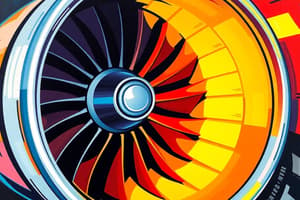Podcast
Questions and Answers
Which component is crucial to inspect during a gas engine tune-up for optimal performance?
Which component is crucial to inspect during a gas engine tune-up for optimal performance?
- Transmission fluid
- Spark plugs (correct)
- Brake pads
- Tire pressure
What is the primary purpose of adjusting the ignition timing during a gas engine tune-up?
What is the primary purpose of adjusting the ignition timing during a gas engine tune-up?
- To increase tire pressure
- To ensure proper fuel combustion (correct)
- To enhance brake efficiency
- To optimize oil viscosity
Which action is typically not recommended during a gas engine tune-up?
Which action is typically not recommended during a gas engine tune-up?
- Changing the oil
- Replacing the air filter
- Checking the battery terminals
- Rebuilding the engine (correct)
Why is it important to check the fuel filter during a gas engine tune-up?
Why is it important to check the fuel filter during a gas engine tune-up?
During a tune-up, what is the recommended interval for replacing spark plugs?
During a tune-up, what is the recommended interval for replacing spark plugs?
Flashcards
Gas engine tune-up
Gas engine tune-up
A set of procedures to optimize the performance and efficiency of a gasoline engine.
Automotive servicing
Automotive servicing
Maintenance and repair procedures for cars and trucks.
Tune-up procedures
Tune-up procedures
Specific steps for optimizing performance of a gas engine.
Test creation
Test creation
Signup and view all the flashcards
Answer key
Answer key
Signup and view all the flashcards
Study Notes
Gas Engine Tune-Up Test
-
Question 1: What is the primary purpose of a gas engine tune-up?
- Optimizing engine performance and efficiency
- Improving fuel economy
- Reducing emissions
- Maintaining optimal engine life
- Correcting potential problems
-
Question 2: List at least four key components typically included in a gas engine tune-up.
- Air filter
- Spark plugs
- Carburetor or fuel injectors (depending on the engine type)
- Ignition system (wires, distributor, etc.)
- Valve clearance (in older engines)
-
Question 3: Describe the function of an air filter in a gas engine.
- Prevents dirt and debris from entering the engine's cylinders, ensuring proper air intake for combustion.
- Improves engine performance.
- Extends engine life by preventing damage from contaminants.
-
Question 4: Explain the importance of checking and replacing spark plugs during a tune-up.
- Ensures proper ignition of the fuel-air mixture.
- Prevents misfires and rough idling.
- Improves fuel economy and power output.
- Improves cold start performance.
-
Question 5: What are symptoms of a faulty spark plug?
- Rough idling or misfiring
- Poor acceleration
- Low fuel mileage
- Difficulty starting.
-
Question 6: How often should spark plugs be replaced?
- Depends on the type of vehicle and driving habits
- Usually every 30,000 to 100,000 miles, or as recommended by the vehicle's maintenance schedule.
-
Question 7: A customer brings in a car with a rough idle, and the mechanic suspects the air filter has low performance. How should the mechanic test the air filter condition?
- Visually inspect the filter for excessive dirt or damage.
- Physically feel the filter for excessive obstruction (using hand to feel for airflow restriction - should be relatively easy to move air through a clean filter).
-
Question 8: What tools are commonly used during a tune-up procedure?
- Screwdrivers, wrenches, socket sets
- Spark plug socket and wrench set
- Gauge tools (for measuring valve clearance, compression, etc.)
- Air filter replacement tools (depending on the filter type)
-
Question 9: Explain the process of replacing a spark plug.
- Gather tools and appropriate spark plugs for engine type
- Properly disconnect the battery to prevent electrical problems
- Remove the old spark plug using a spark plug socket and wrench
- Inspect the plug's condition using a file or other tool for proper cleaning
- Install the new spark plug, ensuring a proper seal.
- Tighten to the recommended torque setting specified by vehicle manufacturer.
-
Question 10: What are some safety precautions to take when working on a gas engine?
- Wear appropriate safety glasses, gloves, and long sleeves
- Ensure the engine is turned off and the ignition is disconnected.
- Use appropriate precautions with tools and potentially dangerous items within the engine.
Answer Key
-
Question 1: Optimizing engine performance and efficiency, improving fuel economy, reducing emissions, maintaining optimal engine life, correcting potential problems
-
Question 2: Air filter, spark plugs, carburetor or fuel injectors, ignition system (wires, distributor, etc.), valve clearance (older engines)
-
Question 3: Prevents dirt and debris from entering cylinders, improves engine performance, and extends engine life.
-
Question 4: Ensures proper ignition of the fuel-air mixture, reduces misfires, improves fuel economy and power output, and improves cold start performance.
-
Question 5: Rough idling/misfiring, poor acceleration, low fuel mileage, difficulty starting.
-
Question 6: Depends on the vehicle type and driving habits, typically every 30,000-100,000 miles or by vehicle manufacturer guidelines.
-
Question 7: Visually inspect the air filter, physically feel the filter for airflow restriction.
-
Question 8: Screwdrivers, wrenches, socket sets, spark plug socket/wrench, gauge tools (for relevant measurements) and air filter replacement tools.
-
Question 9: Detailed steps of removing and installing a new spark plug (from above).
-
Question 10: Wear safety gear (glasses, gloves, long sleeves). Ensure the engine is off and the ignition is disconnected, and employ use of appropriate precautions.
Additional Notes
- Understanding specific engine types (e.g., 4-stroke, 2-stroke) and their respective tune-up requirements can considerably enhance understanding.
- Always refer to the vehicle's repair manual for accurate guidelines and specifications.
- Following manufacturer's recommendations for specific procedures is extremely important.
Studying That Suits You
Use AI to generate personalized quizzes and flashcards to suit your learning preferences.




